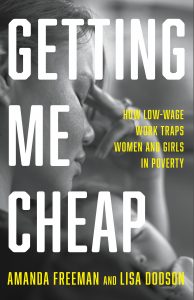On Writing Getting Me Cheap: How Low-Wage Work Traps Women and Girls in Poverty
 I first became interested in the concept of work-family conflict as a college student. I knew I wanted to have a career and a family, and I was introduced to feminist scholarship analyzing the impact of the care burden on women. Feminist economists highlight the ways in which responsibility for care work at home disadvantages women economically. I started to use this lens to look at my own mother who had stopped working as a nurse in a hospital to be more available as a parent, relying instead on part-time hours caring for elderly people in their homes.
I first became interested in the concept of work-family conflict as a college student. I knew I wanted to have a career and a family, and I was introduced to feminist scholarship analyzing the impact of the care burden on women. Feminist economists highlight the ways in which responsibility for care work at home disadvantages women economically. I started to use this lens to look at my own mother who had stopped working as a nurse in a hospital to be more available as a parent, relying instead on part-time hours caring for elderly people in their homes.
Years later, I entered graduate school as the single parent of a two-year old. Lisa Dodson was a professor in the Boston College Sociology department whom I quickly learned had a shared history of single parenthood. I became her graduate assistant researching a community anti-poverty program based in South Boston that served mostly single mothers.
At the same time, I continued reading and studying work-family conflict. By now I realized how skewed the discussion was towards affluent, professional, mostly white women. Mainstream feminist analyses tend to focus on white women who are middle- and upper-income highly educated professionals. On-site childcare, flex time, job shares, parental leave and generous “family-friendly” benefit packages were generally only offered to women at the top of the income spectrum.
For hourly workers, like the ones I was meeting through the anti-poverty program, none of these benefits were offered. They had to be available, in-person for incredibly low-wages and had no resources to pay for help when needed. These single parents desperately needed flexibility at work to accommodate the demands of parenting, but they were much less likely than their affluent counterparts to receive it. What’s more, their extreme version of the conflict wasn’t even recognized as “work-family conflict.”
When I started conducting interviews as a research assistant in 2012, I didn’t imagine this would be the beginning of what would become a decade of interviews and focus groups spanning across the country. My daughter, who is 16 now, remembers me asking her to play with different kids on playgrounds or in community centers while I recorded interviews with moms on park benches.
“Getting Me Cheap” offers a view into the extreme version of work-family conflict experienced by poor mothers across the United States. And while the picture might seem dismal and discouraging, we also offer policy solutions and a vision for the possibilities for organizing women across class lines.
—
Amanda Freeman is an assistant professor of sociology at the University of Hartford and a writer and researcher of motherhood and work. She lives in Westport, Connecticut, and Getting Me Cheap (The New Press) is her first book.
Lisa Dodson is Research Professor Emerita at Boston College. She is the author of The Moral Underground: How Ordinary Americans Subvert an Unfair Economy and co-author (with Amanda Freeman) of Getting Me Cheap: How Low Wage Work Traps Women and Girls in Poverty (both from The New Press) and Don’t Call Us Out of Name. She lives in Portland, Oregon.
Getting Me Cheap: How Low-Wage Work Traps Women and Girls in Poverty
BUY HERE
Category: On Writing

 Two groundbreaking sociologists explore the way the American dream is built on the backs of working poor women
Two groundbreaking sociologists explore the way the American dream is built on the backs of working poor women






















